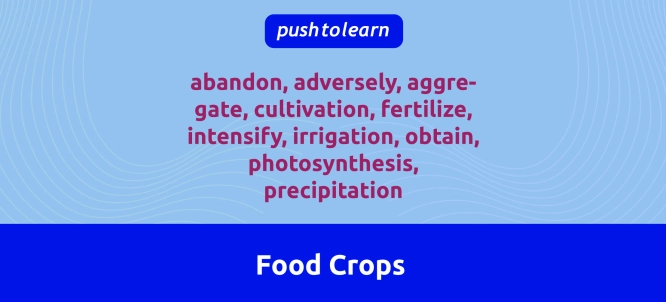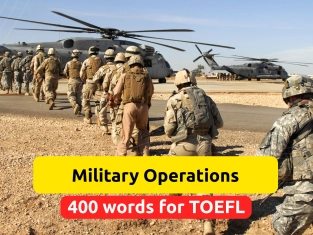by PushtoLearn
Food Crops
Table of Contents
Food Crops Flashcards - Vocabulary Practice for TOEFL
These exercises focus on Food Crops Vocabulary
Topic Overview: Food Crops
Food crops are plants grown specifically to be eaten by people or animals. Farming food crops involves various techniques to grow plants effectively and sustainably. Key processes include cultivation (preparing land for planting), irrigation (watering crops), and fertilization (adding nutrients to the soil). Factors like precipitation (rain, snow, etc.) and photosynthesis (the process plants use to create food) are essential for crop growth. Let’s explore these terms in detail.

Vocabulary List for Food Crops
1. Abandon
-
Definition: To leave something behind or stop doing something completely.
-
Example: "Farmers had to abandon their crops due to the severe drought."
-
Explanation: When crops are no longer sustainable or profitable, farmers might abandon them, leaving them unharvested.
2. Adversely
-
Definition: In a way that causes negative effects or harm.
-
Example: "Lack of rainfall adversely affects crop growth."
-
Explanation: Environmental factors like droughts or storms can adversely impact the health and yield of food crops.
3. Aggregate
-
Definition: The total amount or sum of various parts.
-
Example: "The aggregate production of wheat in the region increased by 10% this year."
-
Explanation: Aggregate is used to describe the overall quantity of crops produced, combining amounts from different farms or areas.
4. Cultivation
-
Definition: The preparation and use of land for growing crops.
-
Example: "The cultivation of rice requires a lot of water."
-
Explanation: Cultivation includes activities like plowing, planting, and caring for crops to ensure they grow properly.
5. Fertilize
-
Definition: To add substances (like compost or chemicals) to soil to make it more productive for growing plants.
-
Example: "Farmers fertilize their fields to increase crop yield."
-
Explanation: Fertilizing enriches the soil with nutrients, which helps plants grow stronger and produce more food.
6. Intensify
-
Definition: To make something stronger or more extreme.
-
Example: "Farmers had to intensify their use of pesticides to protect crops from pests."
-
Explanation: Farmers may intensify certain practices, such as fertilizing or watering, to improve crop production under challenging conditions.
7. Irrigation
-
Definition: The artificial application of water to land to help grow crops.
-
Example: "In dry areas, irrigation is essential for successful crop growth."
-
Explanation: Irrigation systems deliver water to crops, especially in areas where rainfall is insufficient.
8. Obtain
-
Definition: To get or acquire something.
-
Example: "Farmers obtain seeds from local suppliers every planting season."
-
Explanation: In agriculture, farmers obtain necessary resources, like seeds and fertilizers, to start the growing process.
9. Photosynthesis
-
Definition: The process by which plants convert sunlight into food using water and carbon dioxide.
-
Example: "Without photosynthesis, plants could not grow and produce oxygen."
-
Explanation: Photosynthesis is crucial for plant growth as it produces the energy plants need to thrive.
10. Precipitation
-
Definition: Any form of water, such as rain, snow, or sleet, that falls to the Earth’s surface.
-
Example: "Regular precipitation is necessary for maintaining soil moisture levels."
-
Explanation: Precipitation provides natural water for crops, reducing the need for irrigation in many cases.
Summary Table
|
Word |
Definition |
Example |
|
Abandon |
To leave or stop something completely |
"They had to abandon the field after the flood." |
|
Adversely |
In a harmful or negative way |
"The heat adversely affected the crops." |
|
Aggregate |
Total amount or sum of parts |
"The aggregate crop yield was impressive." |
|
Cultivation |
Preparing land for planting |
"The cultivation of corn is common in this area." |
|
Fertilize |
To add nutrients to soil |
"Farmers fertilize to boost growth." |
|
Intensify |
To make stronger or more extreme |
"They intensified efforts to protect crops." |
|
Irrigation |
Artificial application of water |
"Irrigation is key in arid climates." |
|
Obtain |
To get or acquire |
"Farmers obtain seeds every season." |
|
Photosynthesis |
Process plants use to make food |
"Photosynthesis is essential for plant growth." |
|
Precipitation |
Water that falls to Earth’s surface |
"Precipitation levels affect crop health." |
Additional Tips for TOEFL Preparation
-
Review each word’s meaning and practice using it in sentences.
-
Practice with context: Try using these words in discussions about food, farming, and the environment.
-
Connect words to real-world examples: Think about how these words apply to agriculture and food production around the world.
FAQ About the Food Crops Vocabulary Module
How can I remember these vocabulary words for the TOEFL?
Practice regularly by making flashcards or writing each word in a sentence. Connecting each word with a visual image or real-life example can help you remember it better. For instance, imagine a picture of a field when you think of “cultivation” or a watering system when you think of “irrigation.”
What’s the difference between “abandon” and “obtain”?
Abandon means to leave something or stop doing it, often because it’s no longer possible or beneficial (e.g., "Farmers had to abandon the crop due to flooding"). Obtain, on the other hand, means to acquire or get something that is needed (e.g., "Farmers obtain seeds from local suppliers every season").
When should I use “adversely” instead of “negatively”?
Both “adversely” and “negatively” mean “in a harmful way.” “Adversely” is a bit more formal and is commonly used in academic contexts, like on the TOEFL exam. For example, you could say, "The lack of rain adversely affected the crop yield."
Can “aggregate” be used to describe things other than crops?
Yes! “Aggregate” refers to a total amount or sum of parts and can be used in many contexts. For example, “aggregate score” in sports refers to the total score across games, and “aggregate data” refers to combined information from multiple sources.
How are “fertilize” and “irrigation” related to each other?
Fertilize and irrigation are both processes used in agriculture to support crop growth. Fertilizing adds nutrients to the soil to help plants grow stronger, while irrigation provides water to the plants. Both are essential for healthy crops, especially in areas where soil lacks nutrients or there isn’t enough rainfall.
Why is “photosynthesis” important for food crops?
Photosynthesis is the process by which plants make their own food using sunlight, water, and carbon dioxide. Without photosynthesis, plants couldn’t produce the energy they need to grow and produce crops. This process is fundamental for all plant life, including food crops, as it directly influences growth and productivity.
Are these words only relevant to agriculture?
While these words are commonly used in agricultural contexts, many of them are also used in broader fields. For example, “aggregate” is used in statistics, “precipitation” is relevant in meteorology, and “obtain” is useful in general academic writing.
What TOEFL sections could these words appear in?
These words are most likely to appear in the Reading and Listening sections, where topics like biology, the environment, and agriculture are common. Understanding this vocabulary can help you answer questions related to food crops, climate, and ecosystems more effectively.

